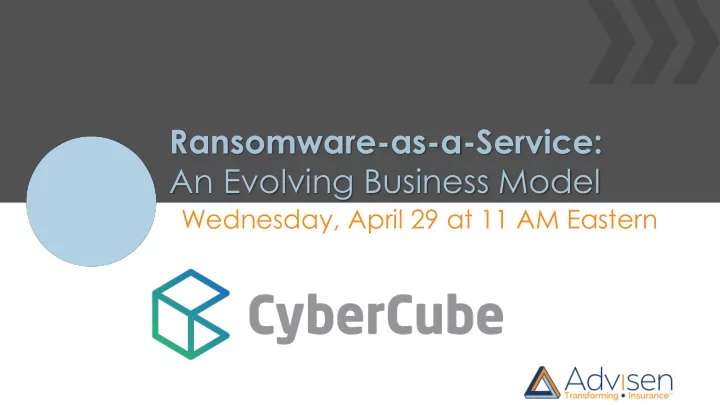

Ransomware-as-a-Service: An Evolving Business Model Wednesday, April 29 at 11 AM Eastern
Ransomware-as-a-Service: An Evolving Business Model Visit www.advisenltd.com at the end of this webinar to download: • Copy of these slides • Recording of today’s webinar
Today’s webinar is sponsored by:
Mark your Calendars! Register for all upcoming webinars at www.advisenltd.com/media/webinars
Today’s Moderator Chad Hemenway Managing Editor Advisen Email at chemenway@advisen.com
Today’s Panelists Oliver Brew Lizzie Cookson Tony Kriesel Alejandro Sauter Head of Client Services Associate Director, Cyber Investigations Senior Claims Underwriter Cyber Risk Analyst Hiscox London Market CyberCube Analytics Kivu Consulting, Inc. CyberCube Analytics
What is ransomware-as-a-service? 1989 “AIDS” Trojan First known malware extortion attack 2005 First Rise PGPCoder & stronger encryption 2013 Second Rise CryptoLocker & Bitcoin 2017 The Big Year WannaCry, NotPetya, BadRabbit 2018 RaaS GandCrab RaaS Affiliate marketing business model
Image Credit: McAfee Labs, High-level overview of the GandCrab RaaS Model
How does the business model work? Affiliates: Developers: o - Ransomware is made accessible o - Buy source code + modify or build from scratch o - Utilize skills and reputations to join “better” o - Advertise ransomware o - Recruit affiliates programs o - Allows for specialization (i.e. different o - Set targets (i.e. amount of infections) o - Percentage (30-40%) per payment obtained methods to reach goals) o - Percentage (60-70%) per payment obtained o - Maintenance (updates, open spots, etc) o - Potential hand-offs involved o - Take less risk (not spreading malware themselves) o - Certain affiliates can rise to become top o - Authors have safe haven sometimes (certain countries performers don’t criminalize malware development, only distribution)
How has the strategy of a ransomware attacker changed? Source: Symantec ISTR, 2019
● - Some RaaS operators adding data exfiltration capabilities ● - Threat to sell, leak, and/or publicize stolen data ● - Further pressure on victim to pay ransom ○ - Avoid disclosure of attack ○ - Avoid leaking sensitive information
Do attackers range in sophistication? Does this affect how a case is handled?
• RaaS platforms vary in terms of what they offer • Some offer a range of packages from “basic” to “platinum” • Pricier subscriptions ensure access to additional features, like customer support, a malware downloader, and longer access to the server
The result: a new wave of amateur ransomware attackers • Little to no technical knowledge • Infection vectors are messy and cause damage to data • When keys fail or the tool doesn’t work, they cannot or will • not troubleshoot
The bad or poorly operated RaaS: • o Platform does not screen their subscribers o Subscribers may have little to no technical knowledge o Subscribers tend to be hostile, disorganized o Malware samples are not updated or improved overtime o Developer provides little to no customer support The good or closely monitored RaaS: • o Developers tightly control their pool of subscribers o Subscribers are rigorously vetted and must have prior hacking/ransom experience o Malware samples and decryption tools are updated every few days or weeks o Developers provide robust customer support
Where does the call from a client come first? Where should it go? Company’s incident response plan should include consideration of: o Cyber insurance and first notice of loss o Ransomware response Ransomware service provider / IT forensics firm should be pre-agreed with insurer o Eliminate need for insurer consent at time of incident? o Permits first notice of incident to service provider rather than insurer?
What costs are covered? How are claims handled? Company must have understanding of its own cyber policy’s terms and conditions Extortion payment o Service provider fees o Business interruption costs o Data recovery costs o Legal costs o Crisis management and public relations costs o Notice and consent o Claims are best handled with preparation and forethought before an incident and then collaboration at the time of the incident If possible, discuss claims handling at time of policy binding o Internal preparation by company’s incident response team and possibly board o Transparent flow of information and communication during (not after) incident o
Ransomware-as-a-Service: An Evolving Business Model Chad Hemenway Advisen Oliver Brew Lizzie Cookson Alejandro Sauter Tony Kriesel CyberCube Analytics Kivu Consulting, Inc. CyberCube Analytics Hiscox London Market
Thank you to our panelists! Oliver Brew Lizzie Cookson Tony Kriesel Alejandro Sauter Head of Client Services Associate Director, Cyber Investigations Senior Claims Underwriter Cyber Risk Analyst Hiscox London Market CyberCube Analytics Kivu Consulting, Inc. CyberCube Analytics
Ransomware-as-a-Service: An Evolving Business Model Visit www.advisenltd.com at the end of this webinar to download: • Copy of these slides • Recording of today’s webinar
For more on Advisen, visit www.advisenltd.com or email us advisenevents@advisen.com
Leading the way to smarter and more efficient risk and insurance communities. Advisen delivers: the right information into the right hands at the right time to power performance . About Advisen Ltd. Advisen is the leading provider of data, media, and technology solutions for the commercial property and casualty insurance market. Advisen's proprietary data sets and applications focus on large, specialty risks. Through Web Connectivity Ltd., Advisen provides messaging services, business consulting, and technical solutions to streamline and automate insurance transactions. Advisen connects a community of more than 200,000 professionals through daily newsletters, conferences, and webinars. The company was founded in 2000 and is headquartered in New York City, with offices in the US and the UK. +1 (212) 897-4800 | info@advisen.com | www.advisenltd.com
Recommend
More recommend